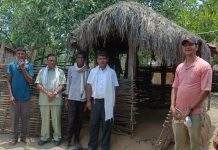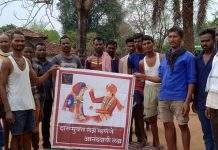
Gadchiroli July 9 (District Correspondent) The Malaria Department has called upon the citizens to take proper precautions to avoid malarial and other winter fevers and diseases.
While enjoying the rains, it is also important to take care of your health. Due to atmospheric humidity, light drizzle as well as continuous rainfall, mosquito breeding sites increase.
There may be a risk of widespread spread of winter fever and other insect-borne diseases and the citizens need to take special care to stay away from such diseases, District Malaria Officer Dr. Kunal Modak has appealed.
June to September is the transmission period for winter fever and other insect-borne diseases. During this time water accumulates in puddles, drains, pits etc. which increases mosquito breeding places and spread of insect diseases.
Winter Fever is transmitted by the female Anopheles mosquito. The female lays her eggs on clear stagnant wate and on the roof of the house, tires, cups, accumulated puddles etc. Chills, followed by fever up to 102-105 degrees Celsius headache are the symptoms of this disease.
Dengue fever is caused by a virus. Millions of people suffer from this disease every year, 5 percent of them also become victims of disease. Dengue fever is transmitted by the female Aedes Aegyptus mosquito. This mosquito is black in colour and the white stripes on its legs. Headache, chills, severe joint and back pain, immobility, rarely bleeding from the nose and mouth of the patient due to fever are the symptoms of this disease.
Chikungunya disease is spread by Aedes Aegypti mosquito. The origin of this mosquito is clean and stagnant water. Fever, headache, vomiting and nausea, body rash, joint pain are the main symptoms. This disease is found in all age groups.
Japanese Encephalitis is transmitted by the female Culex Vishnoi mosquitos which breed in rice farming water and clean water puddles. This disease is found specially in children below 15 years of age.
Elephantiasis is transmitted by a female mosquito called Culex quicifaciatus. These mosquitoes are found on dirty water. As elephantiasis is a disease that is not diagnosed early, everyone ignores this disease. The patient has swelling in the legs as well as in the ovaries due to which the body becomes disfigured.
Screening and treatment of all the above diseases is available in all Primary Health Centres, Rural Hospitals and District Hospitals are available for free.
The main cause of all the above diseases is unsanitary environment around us. Plain and simple remedies can ensure our protection from these dreaded diseases. For that, some remedial plans are needed to be implemented which includes not to allow water to accumulate around your house, empty all stored water in the house once a week, inside and bottom of these reservoirs should be scrubbed, wiped dried and reused and the water reservoirs should be tightly covered.
Fillings up pits in yard and area. Not allowing water to accumulate, while sleeping dress fully, sleep with blankets, close doors and windows between 6 and 8 pm. Nets should be installed, heavy mosquito nets should be used while sleeping, broken boxes on the roof of the house, disposable tyres, cups, pots, etc., should be disposed of in time. Applying nets to toilet pipes, putting kerosene or waste oil down the drain every week.
If everyone does all these things at home, mosquitoes will not breed and bite. Care and timely treatment will keep the people away from the disease, informed Dr. Kunal Modak.






